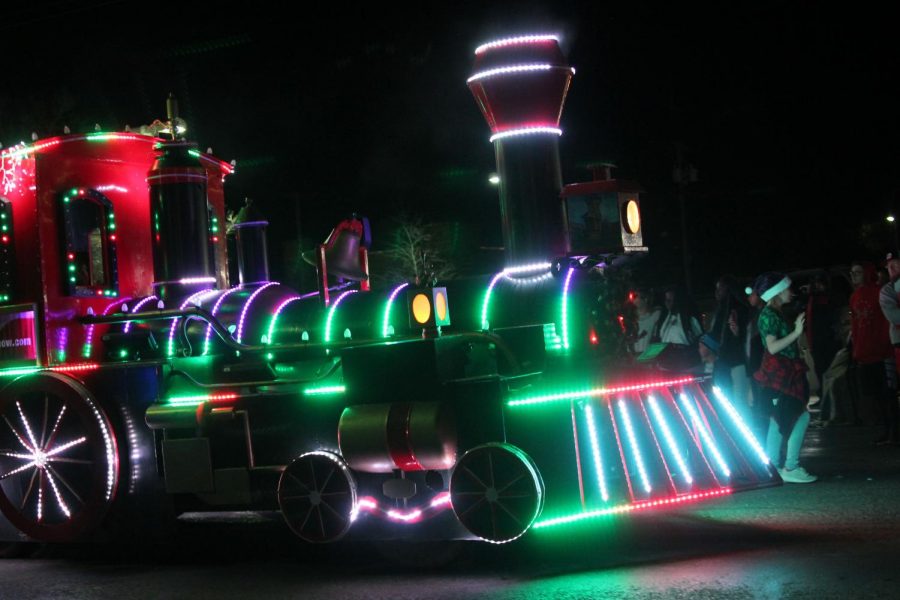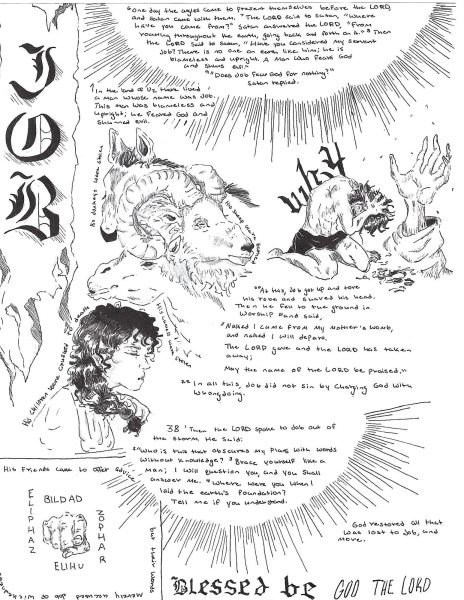The overrated express
Editor-in-chief rails on train wreck of Christmas movie
The train from the movie “Texas,” a far more pleasant holiday train, drives along the Light Parade route in Canyon, Dec. 1.
The song bounces off each wall of my skull.
It’s 2 a.m. I can’t sleep. I normally need only 15 minutes to fall asleep, but tonight is different. The pajama-clad children chant their cheers tauntingly in my head, louder and louder and louder and louder and
“And that’s the way”
louder and louder and louder and
“things happen”
louder and louder and louder and louder
“on the Polar Express!”
When the Christmas decorations and movies emerge from the attic each post-Thanksgiving Sunday, my father begins his favorite holiday tradition: watching “The Polar Express” unceasingly.
The problem with his tradition is the others in my family do not share my father’s (and many others’) deep adoration for “The Polar Express.”
The soothing voice of Tom Hanks welcomes us into the beginning of the film mere hours after we unpacked the Christmas DVDs. My brother and I cry our frustration and despair to no avail. Our father complains he “didn’t watch it that many times last year” and buries the remote under his blanket.
And so, our most consistent holiday tradition begins. We unpack the Christmas decorations from the attic, unleash them upon the house and without fail, douse ourselves in a harrowing flood of “The Polar Express.”
For those reading with no exposure to Santa’s favorite freight, the movie follows a young boy disillusioned with the magic of Christmas and determined to disprove Santa’s existence. A magic train arrives at the boy’s home on Christmas Eve and whisks him away to the North Pole overnight. After surviving a series of challenges along the way, the group finally arrives at Santa’s headquarters. The boy finally dismisses his internalized hatred of Santa and the holidays, and Santa rewards him with the first gift of Christmas. The movie closes with a serenade celebrating the power of belief (in Santa? In the self? I have yet to answer that ever-lingering question.)
The first issue with the movie is its message, but I cannot argue my point while devout Santa believers are reading. Santa believers, it’s been a pleasure, but please stop reading now.
**********************************
All clear? Great.
Santa is nonexistent. Sure, Saint Nicholas existed, but given he last graced the planet with his existence 1,675 years ago, I feel we can safely agree Santa does not exist, certainly not in the manner “The Polar Express” describes.
The movie encourages children naturally aging and questioning Santa to dismiss their questions and continue blindly believing in Santa, only for these same children to eventually learn their doubts were correct and the movie was yet another lie in a series of deceptions. “The Polar Express” instructs children to “just believe” in a falsehood. Children who accept the film’s theme may face disappointment and possibly even the establishment of distrust. If a child doubted Santa and was right despite all the movies and adults saying otherwise, what is to stop that same child from eventually doubting everything else, from religion to science to friends or anything else?
Now, this isn’t to say the movie will guarantee the child pain. Parents can break the news about Santa gently or even put a positive spin on the revelation. A meltdown is not unpreventable. However, the movie does not help to ease the blow.
The focus on Santa is corrupt, but for we the non-believers, that factor is not as devastating as the movie’s various plot holes. If the parents did not believe in Santa, from where did they think the Christmas presents came? Why does the Polar Express purely cater to American children? Why did the conductor not seek out more children, given the caboose is entirely empty except for one shy boy? Why does the train sometimes have five cars and sometimes have 20? Where’s the bathroom? Sure, an animated movie is not meant to seem entirely believable–after all, a train could not survive a ride on pure ice, either–but these holes do not add to the magic of the film. Instead, they distract from the message and the fun and only fuel my fury further with every watch (and wow, do I watch this movie often).
I could complain about any number of other factors–the mildly creepy animation, the underdeveloped characters, Tom Hanks’s many roles and the elves’ blatant rudeness, but I feel my readers understand my point.
But I reluctantly admit the movie is entertaining. Despite its many flaws, it isn’t the worst watch in the world, and it does have a sweet ending. The songs, especially “Hot Chocolate,” are fun to hear. Because its target audience is children, all ages can enjoy its magic. Most importantly, it is undeniably overflowing with Christmas spirit.
So yes, I have some interesting dreams and nightmares derived from my father’s favorite Christmas movie, and yes, it does punctuate far too many days, and yes, the screech of “Herpolsheimer’s! Herpolsheimer’s!” will haunt me for many years to come.
But in the Sheffield home, “The Polar Express” is tradition, and I would not have it any other way.

Hullo! I'm a senior in my third year on staff and my second year as an editor-in-chief. You can catch most of my work in the news and blogs sections. When I'm not around the school with a camera and a press pass, I spend my time in choir, musical, various...











